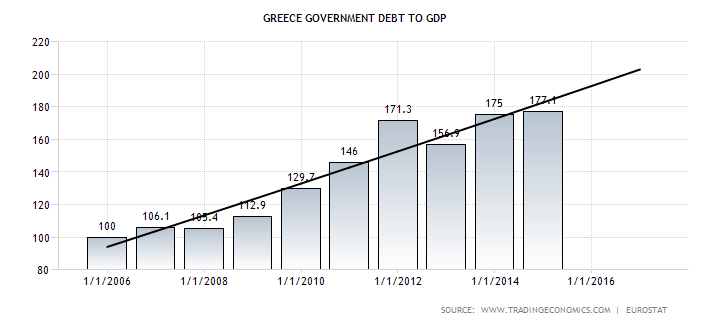After a marathon negotiating session, Greece appears to have struck a deal for additional bailout funds from the Eurozone. However, all is not well within the Adriatic country and it will remain to be seen if the deal truly saves or stymies the Greek people.
The €86b debt restructuring deal is highly conditional upon Greece passing a range of reforms by Wednesday, which is already causing cracks to appear within PM Tsipras’s own political party. Many left leaning members are suggesting that the austerity conditions go too far and attack the party’s core platform of protecting pensions and social welfare. Subsequently, Mr Tsipras faces a revolt within his own party that he will need to quell before securing the first tranche of bailout funds.
Despite a referendum result from Greek citizens that resoundingly rejected further austerity, Tsipras has remained hell bent upon obtaining a financial life line for the embattled state. Subsequently, political analysts have questioned his motivations in light of the severe cuts to social programs. The reality is that the debt restructuring agreement was less to do with long term economic reform and more to do with saving socialism in Greece.

Considering the huge Debt-to-GDP burden, and the continued contraction within the Greek economy, it is clear that country is effectively bankrupt and with little chance of seeing economic growth. Subsequently, without continued access to the debt markets and the additional bailout funds, it is unlikely that Greece could continue to support the bloated pensions and social welfare programs that are a key component of their democratic socialist administration. Faced with the ultimate collapse of a raft of left wing economic policies, PM Tsipras took the only option available to retain some vestige of socialism in Greece, capitulation.
However, the capitulation does nothing to improve the economic plight of the Greek people as the new raft of loans is set to increase the Debt-to-GDP ratio to above 200%. It is patently obvious that an eventual debt haircut will be needed to ensure any chance of paying off their creditors. Failure to address the current debt loading will only extend the current pain and lead to a fourth, and likely final, financial crisis in the future.
It is not surprising that the Eurozone, and by extension Germany, were resistant to any form of debt relief. There exists a significant moral hazard at play within the Eurozone in that any form of debt relief would set a precedent that other member states would seek to exploit. Ultimately, Germany takes the view that there must be stern repercussions for fiscal irresponsibility, lest others within the Eurozone seek to explode their sovereign debts with the expectation that a bailout will be forthcoming.
Leading up to the parliamentary votes in Greece, it is likely that there will be much finger pointing as to whom is responsible for the economic failures. Capitalism and EU cronyism is likely to end up being pilloried in the Greek press. However, it needs to be understood that the ultimate responsibility for the crisis lays with successive Greek governments who expanded the overall debt load to provide for increased social welfare programs. Subsequently, much of the proposed debt deal seeks to unwind these spending provisions.
The raft of policy changes, required by the Troika, is set to move Greece towards a more open economy, whilst reducing pensions and public payments. However, there are some systemic problems with the troika’s proposals in that they are geared towards repayment of debt rather than economic growth.
A case in point, the levying of additional taxes will actually reduce economic growth potential at a time when business activity should be encouraged. Also, the creation of a €50B privatisation fund, whilst a step in the right direction for liberalisation of Greek industries, will fail in stimulating much in the way of growth as the raised funds will likely go direct to creditors.
Regardless of their status within the Eurozone, the way forward for Greece is clear in that they need to focus upon economic policy that is likely to open and stimulate their economy. Only through increased economic activity can they expect to grow GDP and provide a better standard of living to their citizens. This will require significant pain in the short run but the alternative is even less palatable: a decade of debt slavery which would eventually lead to another crisis.
